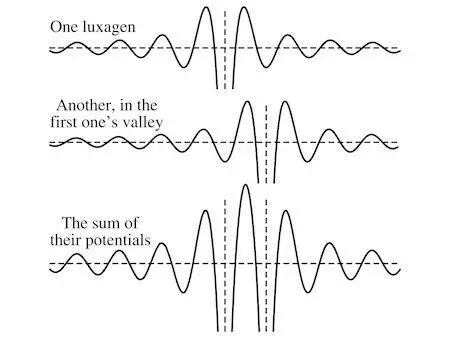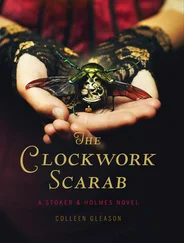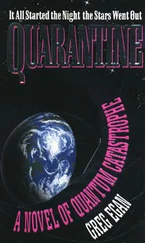Greg Egan - The Clockwork Rocket
Здесь есть возможность читать онлайн «Greg Egan - The Clockwork Rocket» весь текст электронной книги совершенно бесплатно (целиком полную версию без сокращений). В некоторых случаях можно слушать аудио, скачать через торрент в формате fb2 и присутствует краткое содержание. Жанр: Фантастика и фэнтези, на английском языке. Описание произведения, (предисловие) а так же отзывы посетителей доступны на портале библиотеки ЛибКат.
- Название:The Clockwork Rocket
- Автор:
- Жанр:
- Год:неизвестен
- ISBN:нет данных
- Рейтинг книги:3 / 5. Голосов: 1
-
Избранное:Добавить в избранное
- Отзывы:
-
Ваша оценка:
- 60
- 1
- 2
- 3
- 4
- 5
The Clockwork Rocket: краткое содержание, описание и аннотация
Предлагаем к чтению аннотацию, описание, краткое содержание или предисловие (зависит от того, что написал сам автор книги «The Clockwork Rocket»). Если вы не нашли необходимую информацию о книге — напишите в комментариях, мы постараемся отыскать её.
The Clockwork Rocket — читать онлайн бесплатно полную книгу (весь текст) целиком
Ниже представлен текст книги, разбитый по страницам. Система сохранения места последней прочитанной страницы, позволяет с удобством читать онлайн бесплатно книгу «The Clockwork Rocket», без необходимости каждый раз заново искать на чём Вы остановились. Поставьте закладку, и сможете в любой момент перейти на страницу, на которой закончили чтение.
Интервал:
Закладка:
Palladia was incredulous. “To a dust particle with infinite velocity , that force is nothing, it’s completely irrelevant!” She addressed Yalda imploringly. “You agree with me, don’t you? Or is everyone going mad?”
Isidora nodded to Yalda: your turn .
Yalda said, “I agree with you completely—which means the flashes can’t be coming from anything moving so fast. They must be coming from orthogonal dust… I mean dust that was orthogonal to us before the launch, not now.”
Palladia blinked. “Hurtlers? Original Hurtlers?”
“How else could it make sense?” Yalda replied. “Whatever it is that’s been causing the flashes must be moving so slowly relative to the Peerless that our spin is enough to brush them away. Well, we always knew that our trajectory would tame the Hurtlers.”
Palladia grimaced. “But if we’ve tamed them, what caused the flashes? How could something striking us so slowly turn the rock white-hot?”
“I have absolutely no idea,” Yalda confessed, “but if it wasn’t kinetic energy that was heating the rock, all I can think of is some chemical process—and the dust must have needed to stay on the rock long enough to react with it in some fashion. Now that the slopes are unable to hold on to debris… no more flashes.”
Palladia was angry now. “You’re telling me that Hurtlers are made of… what? A liberator for calmstone? The dust from the orthogonal worlds that fills the void here isn’t actual rock, it’s a refined substance people extract from plants with the express purpose of causing fuel to burn?”
Yalda said, “Not the sarcastic bit at the end, but whatever’s been hitting us must act as a liberator for calmstone. Don’t ask me how—but if you don’t believe that, tell us how else you can explain the sudden cessation of the flashes.”
Palladia glared back at her in silence, then she said, “I have no idea. But you’re right, it can’t be a coincidence. The spin is protecting us. So whatever’s been striking us, it’s not high-velocity material.”
“Which means there’s no reason, now, to believe that even a piece dozens of times larger than those that caused the flashes could set the slopes on fire,” Yalda suggested.
“No reason at all,” Palladia agreed.
“So our plan for exploding walls is superfluous?”
Palladia hesitated. “Absolutely. We just need some sacrificial cladding near the axis—at the summit and the base, where the centrifugal force offers no protection…” She stopped speaking; she was trembling with relief.
Yalda put a hand on Palladia’s shoulder then turned to Isidora. “I think we should all go in there and share the good news with Frido and his friends.”
19
“Be warned,” Yalda said, “that I’m going to be spending most of my time telling you about things I don’t understand. Along the way I’ll offer you a few facts and a few guesses—but then I’ll explain why those facts aren’t quite enough and why those guesses can’t quite be right.”
She looked out across the room. Many of the faces were familiar to her, young women and men whose education she’d been following from the start. But there were half a dozen students she barely recognized, too, which was even more encouraging. Once they put the old barbarities behind them, everyone on the Peerless could live the life of the mind. One day they’d all be doing rotational physics with their eyes closed, thinking about the symmetries of four-space as naturally as they moved their limbs.
“What don’t I understand?” she continued. “I don’t understand why solids are stable. I don’t understand why gases aren’t sticky. And I don’t understand why the gentlest contact with the dust that surrounds us can turn rock white-hot.”
“I thought we proved that solids were stable,” Ausilia interjected. “In our last class with Severa.”
Yalda said, “What you did, I think, was show that there are several geometries that an array of luxagens can assume in which Nereo’s force, acting between them, would hold them in place. Is that right?”
“That’s how I understood it,” Ausilia replied.
“So how does that work?”
“Every luxagen is surrounded by hills and valleys of potential energy,” Ausilia said. “If you have a number of them, you can drop them all into their neighbors’ valleys, making a nice, neat pattern in which they should all prefer to stay put.”
“That’s perfectly true,” Yalda said. “But there are a couple of problems Severa wouldn’t have raised, to avoid confusing you while you were still learning the fundamentals.”
She sketched a basic one-dimensional example.

“A luxagen can sit in its neighbor’s energy valley,” she said. “And I’ve put it in the first valley, rather than any of the more distant ones, which are shallower than the first. But is that really the deepest place there is?”
There was silence for a few pauses, then Prospera offered, “The pit would be deeper.”
“Of course,” Yalda replied. “The pit centered on the luxagen itself is bottomless, though I’ve only drawn it going down a short way. Once they’re close enough, two positive luxagens just keep attracting each other ever more strongly, until they collide. So why don’t all the luxagens in a piece of rock simply end up falling into each other’s energy pits, until the whole rock has shrunk down to a speck?”
“Isn’t that like asking why the world doesn’t crash into the sun?” Fatima suggested. “If there’s any sideways motion, the two luxagens wouldn’t actually collide. If they started outside the pit, they’d just skim around it and end up outside again. And even if they had the right amount of energy to stay in the pit, wouldn’t they just orbit each other, like Gemma and Gemmo?”
“You’re right,” Yalda said. “But if two luxagens end up orbiting each other, there’s something more to think about: a luxagen moving back and forth makes light . If the luxagens create light, they need to provide true energy to do that. But to provide true energy—to lose it themselves and turn it into light—they need to gain kinetic or potential energy. So why don’t they end up moving faster and faster, and breaking the whole solid apart?”
Silence again. Then Giocondo—a young man Yalda could only name from his tag—said, “What if the luxagens are moving too fast to make light?”
Yalda waited a pause to let the other students ponder that. “Go on,” she said.
“There’s a maximum frequency of light,” Giocondo began tentatively. “In the equation for light, the sum of the squares of the frequencies in the four directions must equal a fixed number—so none of the individual frequencies can have squares that are bigger than that number. If a luxagen is moving back and forth with a greater frequency than that… it can’t create light in step with its motion, because there’s no such thing.”
Yalda said, “That’s correct. And eventually we’ll work through the calculations for the amount of true energy that an oscillating luxagen passes to the light field, and we’ll show that when the frequency crosses the threshold Giocondo’s just described, the energy flow drops to zero.”
“Then why is there still a problem?” Ausilia asked. “Oh… why don’t all the luxagens end up orbiting in one single energy pit?”
Prospera said, “Because the peaks around the pit keep getting higher. Maybe a few luxagens are orbiting in the same pits, but the more of them you throw in together, the higher the energy barrier around them becomes.”
Читать дальшеИнтервал:
Закладка:
Похожие книги на «The Clockwork Rocket»
Представляем Вашему вниманию похожие книги на «The Clockwork Rocket» списком для выбора. Мы отобрали схожую по названию и смыслу литературу в надежде предоставить читателям больше вариантов отыскать новые, интересные, ещё непрочитанные произведения.
Обсуждение, отзывы о книге «The Clockwork Rocket» и просто собственные мнения читателей. Оставьте ваши комментарии, напишите, что Вы думаете о произведении, его смысле или главных героях. Укажите что конкретно понравилось, а что нет, и почему Вы так считаете.










